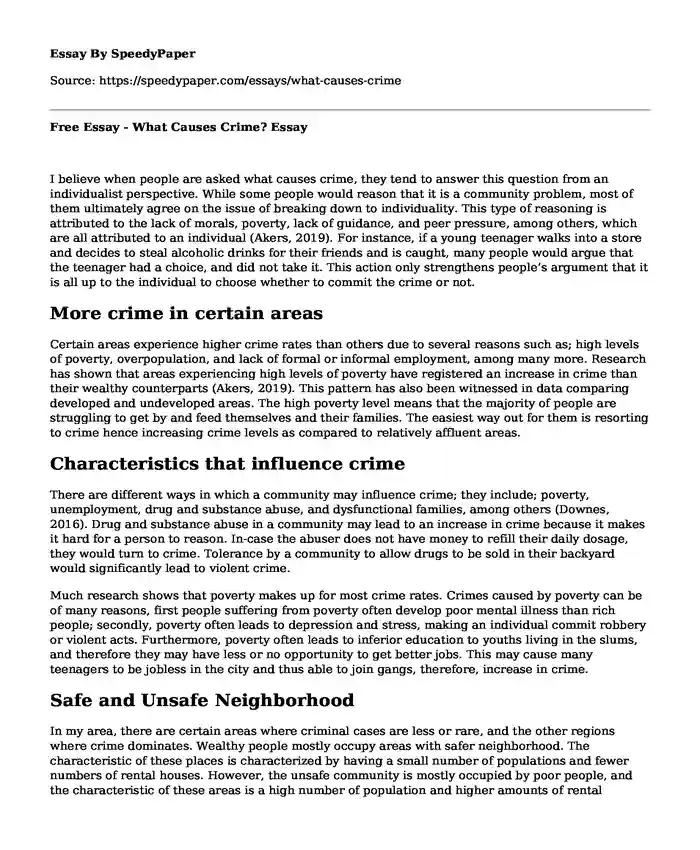
| Type of paper: | Essay |
| Categories: | Criminal law Criminal justice Social issue |
| Pages: | 3 |
| Wordcount: | 730 words |
I believe when people are asked what causes crime, they tend to answer this question from an individualist perspective. While some people would reason that it is a community problem, most of them ultimately agree on the issue of breaking down to individuality. This type of reasoning is attributed to the lack of morals, poverty, lack of guidance, and peer pressure, among others, which are all attributed to an individual (Akers, 2019). For instance, if a young teenager walks into a store and decides to steal alcoholic drinks for their friends and is caught, many people would argue that the teenager had a choice, and did not take it. This action only strengthens people’s argument that it is all up to the individual to choose whether to commit the crime or not.
More crime in certain areas
Certain areas experience higher crime rates than others due to several reasons such as; high levels of poverty, overpopulation, and lack of formal or informal employment, among many more. Research has shown that areas experiencing high levels of poverty have registered an increase in crime than their wealthy counterparts (Akers, 2019). This pattern has also been witnessed in data comparing developed and undeveloped areas. The high poverty level means that the majority of people are struggling to get by and feed themselves and their families. The easiest way out for them is resorting to crime hence increasing crime levels as compared to relatively affluent areas.
Characteristics that influence crime
There are different ways in which a community may influence crime; they include; poverty, unemployment, drug and substance abuse, and dysfunctional families, among others (Downes, 2016). Drug and substance abuse in a community may lead to an increase in crime because it makes it hard for a person to reason. In-case the abuser does not have money to refill their daily dosage, they would turn to crime. Tolerance by a community to allow drugs to be sold in their backyard would significantly lead to violent crime.
Much research shows that poverty makes up for most crime rates. Crimes caused by poverty can be of many reasons, first people suffering from poverty often develop poor mental illness than rich people; secondly, poverty often leads to depression and stress, making an individual commit robbery or violent acts. Furthermore, poverty often leads to inferior education to youths living in the slums, and therefore they may have less or no opportunity to get better jobs. This may cause many teenagers to be jobless in the city and thus able to join gangs, therefore, increase in crime.
Safe and Unsafe Neighborhood
In my area, there are certain areas where criminal cases are less or rare, and the other regions where crime dominates. Wealthy people mostly occupy areas with safer neighborhood. The characteristic of these places is characterized by having a small number of populations and fewer numbers of rental houses. However, the unsafe community is mostly occupied by poor people, and the characteristic of these areas is a high number of population and higher amounts of rental houses. Therefor high society and high numbers of rental apartments are equal to high crime rates (Hester, 2017).
Social Disorganization
Social disorganization states that a person behaves mostly influenced by the environment surrounding the person, both physical and social (Alshalan, 2020). Therefore most people who live in areas with violence, drug abuse, family dysfunctions, and other criminal acts are likely to turn into crime hence increasing crime rates.
Reference
Akers, R. L., & Jennings, W. G. (2019). The social learning theory of crime and deviance. In Handbook on crime and deviance (pp. 113-129). Springer,https://link.springer.com/chapter/10.1007/978-3-030-20779-3_6
Alshalan, A. (2020). Cyber-crime fear and victimization: An analysis of a national survey (Doctoral dissertation, Mississippi State University). https://ir.library.msstate.edu/handle/11668/16977
Downes, D., Rock, P. E., & McLaughlin, E. (2016). Understanding deviance: a guide to the sociology of crime and rule-breaking. Oxford University Press. https://books.google.com/books?hl=en&lr=&id=oCD4CwAAQBAJ&oi=fnd&pg=PP1&dq=crime+sociology&ots=NuRvFjHe_P&sig=in6yJZstQ6GHqUYR6SdK7856mxU
Hester, S., & Eglin, P. (2017). Sociology of crime. Taylor &Francis.https://books.google.com/books?hl=en&lr=&id=9CMlDwAAQBAJ&oi=fnd&pg=PP1&dq=crime+sociology&ots=DpnO--TD9Q&sig=gRNA7Exkormj2QJ4Fx5aV830Bxs
Cite this page
Free Essay - What Causes Crime?. (2023, Nov 19). Retrieved from https://speedypaper.net/essays/what-causes-crime
Request Removal
If you are the original author of this essay and no longer wish to have it published on the SpeedyPaper website, please click below to request its removal:
- Free Essay on Organizational Conflicts in Hospitals
- Free Essay Example on Court Hearing
- Free Essay - Corporate Social Responsibility
- Free Essay. Natural Capital Between Providing and Disposing of Water
- Free Essay on Social Movement: Coercion, Money, Words
- Free Essay. Current Crime Policy
- Is Racism Human Nature? Paper Example
Popular categories




